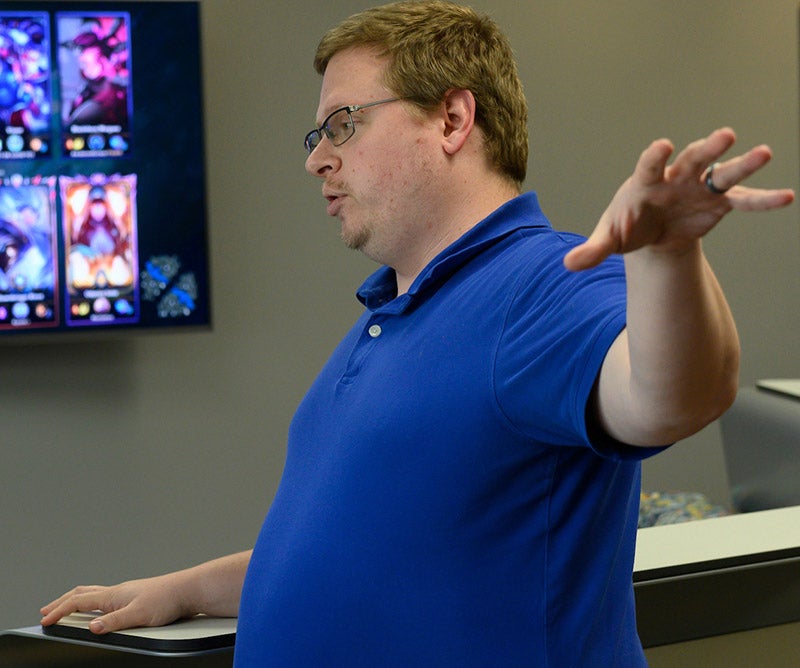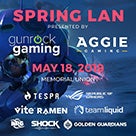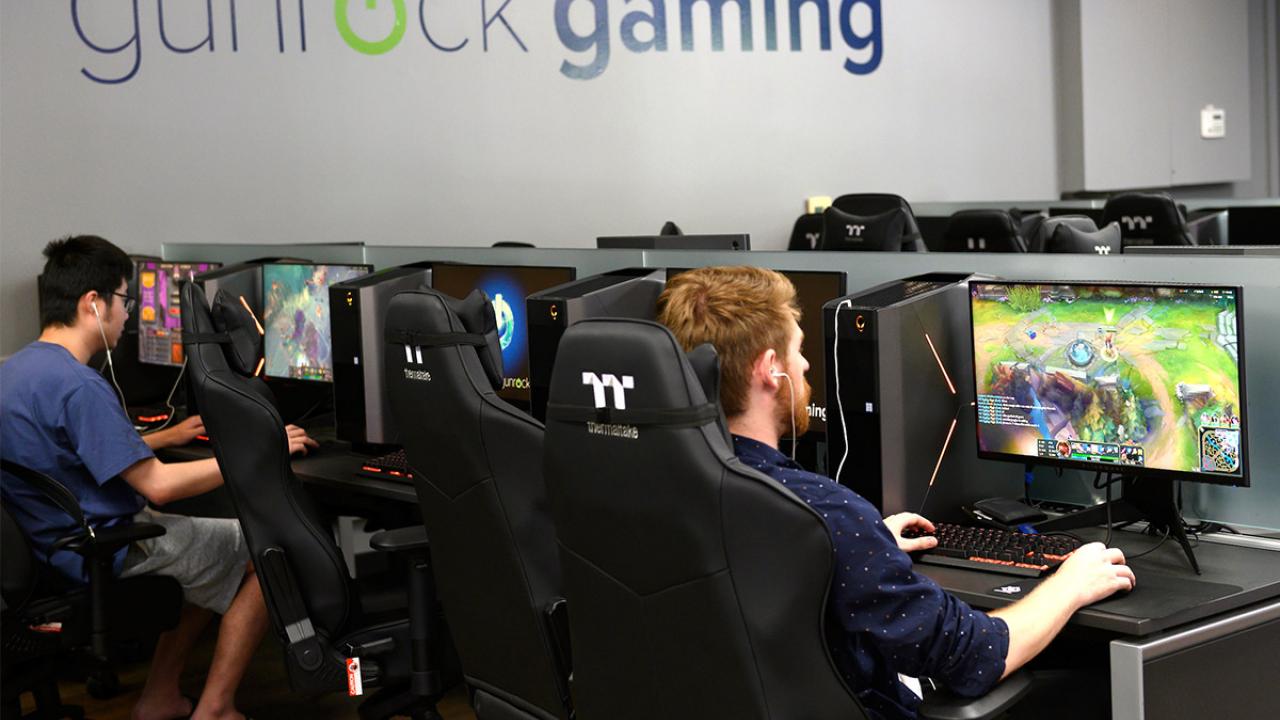Rows of monitors stare at me as soon as I step into the former TechHub, recently renovated and christened Gunrock Gaming. I take another look and see heads bobbing behind the monitors.
The room is comfortably filled — aside from everyone sitting behind monitors, students mill about, watching the gaming livestream platform Twitch on two flatscreen TVs and making conversation. White noise from fingers hitting keyboards sounds like falling water. A couple of students sit on the couch arced around a wide table, laptops open.
Coming into the visit, League of Legends and Fortnite, the top two titles I associate with “gaming,” pop into my head.
GUNROCK GAMING: IF YOU GO
- Hours — 10:30 a.m.-10 p.m. daily
- Location — East side of the Memorial Union
- Fees — $4 per hour for students and Campus Recreation members and $8 per hour for others
- Games — 14, including Minecraft, World of Warcraft, League of Legends and Fortnite, with four more on the way
League of Legends, released in 2009, had 100 million active monthly users in 2016. The 2018 world championship — where professional teams square off — had 99.6 million viewers worldwide. Gunrock Gaming stats reflect this popularity: League of Legends, a multiplayer battle arena game where players on a team control champions and try to destroy a protected structure in the opposing team’s base — was April’s most-played game. And a League of Legends team was the first professional electronic sports, or esports, team fielded by a public university: UC Irvine, which launched the team in 2016 alongside the unveiling of its own esports arena.
Fortnite, a single or multiplayer game where players aim to be the last standing while defending residents of a post-apocalyptic island, came out in 2017 and also has its own esports teams and championship. This March, the developer said there were 250 million Fortnite players. The game even made a cameo in the blockbuster film Avengers: Endgame.
But I don’t play either game, and at first glance, most of the monitors depict the familiar League of Legends jungle or Fortnite arena. It seems the space seems to cater exclusively to their players.
Ferguson Mitchell '12, Games Area coordinator and primary mind behind the space, dispelled that myth by pointing out the list of games, which includes go-at-your-own-pace, open-world titles such as Minecraft and — to come later — The Sims.

Even before he shows me the list, I wonder what the commonalities between fans of different games are — what does each player get out of a game? Why does the university have a stake in gamers’ emotional payoff?
During the center’s grand opening, I talked with junior Jack Concordia, president of Aggie Gaming, who explained games’ importance — both to the university and to students.
“Gaming is stress relief. It provides an outlet to be creative — you can make or play games,” he said. “And Gunrock Gaming helps make games more accessible. It’s important for the university to offer that community (for gamers) to do what you love, and it shows that they’re listening to student needs and demands.”
Mitchell echoed Concordia’s opinions, saying he would have loved a similar space during his time as a student.
“Gaming is a really big hobby for the student demographic that hasn’t really been addressed,” said Mitchell. “If you want to work out, you go to the ARC. But if you’re into gaming, you see all these computers (like in Kemper Hall, home of the Department of Computer Science), but you can’t really do anything with them. This is a dedicated space for gamers — we try to be really open and accessible for students.”
Their eyes fond, Concordia and Mitchell touched on their past experience with gaming. Concordia reminisced on games he played in high school. Mitchell talked about starting the Starcraft II club at Davis and talked about his esports experience — working as a team manager, commentator and journalist for the past 10 years.
For both, college enabled them to find and create welcoming gaming communities. Similarly, though most of my close friends have been gaming for much of their lives, I didn’t notice the hobby’s popularity until I reached college.

Facebook: Gunrock Gaming played host to gaming fest
Aggie Gaming: The Spring LAN is finally here, presented by Gunrock Gaming and Aggie Gaming and powered by Tespa and ASUS ROG! Swing by the Memorial Union for a jam-packed day with games, games, and, you guessed it, games!
I shared this with Concordia, who affirmed my observation. “In middle school and high school, games are really seen as ‘nerdy,’” he said. People feel a lot more open talking about games now (in college).”
This eagerness was apparent: The Aggie Gaming booth was surrounded by a crowd of onlookers during the grand opening, including some who stayed to chat with Concordia’s fellow officers about gaming after grabbing flyers. The talk about games bled into conversation about career goals, majors and classes.
While Concordia fielded different conversations, I reflected on the scene’s dissonance. To me, gaming seemed a solitary activity — even multiplayer games like League of Legends are focused on individual development. Yet the people chatting animatedly around me were anything but isolated.
“You’d think fans of single-player games would be alienated from other gamers,” agreed Concordia. “But even with single-player games, you can share the experience by talking about what you like or hate,” he said. “And all of these communities — with different personalities and perspectives, experienced and beginning gamers — come together for a big reason: We love gaming.”
Mitchell hopes that Gunrock Gaming will encourage more people to come together to learn about and share their love for gaming.
Having piloted the MU bowling alley’s special events program, which allows organizations to host fundraisers at the bowling alley, Mitchell wants to start a similar program through Gunrock Gaming. Other future plans he has for the space include hosting “intro to gaming” classes, coaching, casual tournaments, skills workshops, campus rec leagues and viewing parties to support Aggie Gaming’s top esports teams.
Ultimately, Mitchell said, he’d really like to make the space the hub for all kinds of gaming on campus, for all people of different ability levels. “Whether you’re just beginning, or if you’re really hardcore and been playing all your life — I wanna be that space for people, no matter what games you’re interested in.”
When I got home, I dusted off my Nintendo DS console and booted up an old Pokémon game. Instantly, I was hit with nostalgia. Seeing that mirrored in both Mitchell and Concordia helped me understand the emotional resonance games offer — regardless of platform or type.
And knowing Mitchell, an avid gamer and fan, heads Gunrock Gaming leaves me hopeful for the center’s future: This is his passion project, and I’m excited to see how the programming he’s planned for the space emboldens and diversifies the campus gaming community.
Media Resources
Janelle Salanga, News and Media Relations
